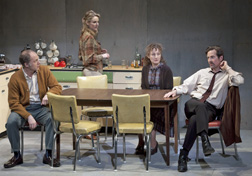Lucy Komisar
"Benefactors" is Michael Frayn's
wry look at good intentions gone bad
Written by Michael Frayn; directed by Carl Forsman.
Keen Company at Clurman Theatre, 410 West 42 Street, New York,
NY.
212-239-6200; http://www.keencompany.org/home/
Opened April 5, 2011; closes April 30, 2011.
Reviewed by Lucy Komisar April 8, 2011.
"Benefactors" begins in 1968, during an era when England
was building controversial housing projects. It was written
in 1984 by Michael Frayn, who two decades later authored "Democracy,"
the powerful recreation of West German Chancellor Willy Brandt's
early 70s dealings with East Germany. In both cases, in overlapping
eras, the personal becomes political, and there is a strong
ideological message that expresses Frayn's general concern about
democracy, writ small and writ large.
 |
| Daniel Jenkins as David, Vivienne
Benesch as Jane, Deanne Lorette as Sheila and Stephen Barker
Turner as Colin. Photo by Richard Termine. |
As a slice of British social history this play
is interesting, though it also seems dated, in spite of the
very professional efforts of the actors and Keen Company director
Carl Forsman. The characters appear to inhabit a long-running
soap opera. The action takes place around the kitchen table
of David (Daniel Jenkins) and Jane Kitzinger (Vivienne Benesch).
David, an architect, is in charge of a slum clearance project
to build some council flats – public housing. He is idealistic
about creating worthy spaces and insists, "I am not going
to build towers." However, the requirements of a government
subsidy will require some high-rises.
People in government want to help the poor. Of course towers
are not what anyone wants. But construction and other exigencies
move the well-intentioned bureaucrats to increasingly ignore
the best interests of the people they are supposed to be benefiting.
 |
| Stephen
Barker Turner as Colin and Deanne Lorette as Sheila. Photo
by Richard Termine. |
Then there's the couple across the way, Colin
Molyneux (Stephen Barker Turner), a hack journalist, and Sheila
(Deanne Lorette), his wife, a nurse. He is nasty and overbearing
to her; she is timid and insecure. She seems down-trodden.
David and Jane try to help by making their house a refuge for
Sheila and her kids. Colin responds by leaving his wife and
organizing a movement to stop the redevelopment scheme. Colin
mines irony by calling the Basuto Road slum area "Basutoland,"
which has an African sound and mimics the "white man's
burden" attitude toward the poor.
By 1984, we learn what good intentions have wrought with the
project and the Molyneuxs.
This is a small play compared to "Democracy" (2003)
and to "Copenhagen," Frayn's other major political
drama, which opened in London in 1998. But it's worth seeing
for people interested in the trajectory of his work.
Visit Lucy Komisar's Website




